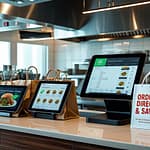Key Takeaways:
- Implement structured schedules to ensure smooth restaurant operations and reduce stress.
- Prioritize regular employee training to increase efficiency and decrease workload.
- Establish a robust inventory management system to avoid supply shortages and excess.
- Incorporate regular downtime and self-care into your routine to maintain mental well-being.
- Use technology such as restaurant management software to streamline tasks and increase productivity.
How to Run a Restaurant Without Losing Your Mind
Running a restaurant is an exciting yet demanding endeavor. As a restaurant owner or manager, you juggle countless responsibilities—overseeing staff, managing operations, maintaining food quality, and ensuring customer satisfaction. The fast-paced nature of the restaurant industry makes it easy to feel overwhelmed and stressed, but it doesn’t have to be this way. By adopting strategic management practices, you can reduce mental stress, boost productivity, and keep your sanity intact. This article explores practical steps you can take to streamline your restaurant management and thrive in your role without burnout.
Set Clear Priorities and Goals
One of the most common sources of mental stress among restaurant managers is feeling overwhelmed by endless tasks. Without clear priorities, you may find yourself constantly reacting to urgent demands rather than proactively managing operations.
Identify and Prioritize Key Tasks
Begin by listing your daily, weekly, and monthly responsibilities. Determine which tasks are critical to your restaurant’s success, such as inventory management, staffing, and customer service. Prioritize based on urgency and importance, and delegate non-critical tasks when possible.
- Daily tasks: Staff scheduling, inventory checks, customer feedback review
- Weekly tasks: Menu planning, supplier orders, staff meetings
- Monthly tasks: Staff performance evaluations, financial reviews, marketing strategies
Case Study: Streamlining Operations at a Popular Cafe
A busy cafe in Seattle faced operational chaos due to unclear priorities. The manager implemented a structured priority list, clearly defining daily, weekly, and monthly tasks. As a result, staff felt less overwhelmed, productivity increased, and customer satisfaction improved significantly.
Implement Effective Delegation
Restaurant management is not a solo act. Attempting to handle everything yourself is a recipe for burnout. Effective delegation allows you to distribute responsibilities among your team, freeing up your time and mental bandwidth.
Identify Staff Strengths
Each staff member has unique skills and strengths. Identify which employees excel in particular areas—such as customer interaction, organization, or culinary skills—and delegate tasks accordingly. Leveraging staff strengths improves efficiency and boosts morale.
Clearly Communicate Expectations
Delegation only succeeds when expectations are clear. When assigning tasks, provide specific instructions, deadlines, and desired outcomes. Regularly check in with staff to address questions or concerns and provide constructive feedback.
Industry Example: Delegation Success at a Bistro
A neighborhood bistro in New York City struggled with managerial burnout until the owner began delegating responsibilities. By assigning inventory management to a trusted assistant manager and front-of-house operations to experienced staff, the owner reduced personal workload significantly and improved overall productivity.
Create Effective Systems and Routines
Chaos thrives in the absence of structured systems. Establishing clear routines and standardized processes enhances productivity, reduces errors, and minimizes mental stress.
Standardize Operational Procedures
Document standard operating procedures (SOPs) for key tasks, including inventory management, cleaning schedules, and customer service protocols. Clear SOPs help staff understand expectations and execute tasks efficiently.
Maintain a Consistent Schedule
Consistency is crucial in the restaurant industry. Establish regular routines for tasks such as inventory checks, staff meetings, and financial reviews. Maintaining a predictable schedule reduces stress and enhances operational efficiency.
Example: Improved Productivity at a Family-Owned Restaurant
A family-owned restaurant in Austin implemented standardized procedures for its kitchen and front-of-house operations. Clear systems significantly reduced confusion among staff, lowered stress levels, and increased the restaurant’s overall productivity.
Invest in Staff Training and Development
Your employees are your greatest assets. Investing in ongoing training and development reduces employee turnover, improves customer satisfaction, and decreases your mental stress by ensuring a reliable team.
Conduct Regular Staff Training Sessions
Organize regular training sessions covering customer service, menu knowledge, and operational procedures. Well-trained employees are more confident, efficient, and less dependent on constant supervision.
Cultivate a Positive Work Environment
Create an environment that encourages open communication, teamwork, and employee recognition. Staff members who feel valued are more productive, motivated, and committed to achieving restaurant goals.
Case Study: Employee Development Success Story
A popular steakhouse in Chicago introduced monthly training programs and team-building activities. As a result, the restaurant experienced lower turnover rates, improved employee morale, reduced managerial stress, and consistently high customer reviews.
Utilize Technology for Better Management
Technology can be a powerful ally in reducing mental stress and improving productivity. Restaurant management software and digital tools streamline operations, reduce human error, and simplify complex tasks.
Implement Restaurant Management Software
Consider adopting management software for tasks such as scheduling, inventory tracking, and financial reporting. Digital tools save time, reduce errors, and provide valuable insights to improve decision-making.
Automate Tasks Where Possible
Automation frees up valuable time for restaurant managers. Use digital ordering systems, reservation platforms, and online payroll software to streamline daily operations and reduce administrative burdens.
Industry Example: Technology Implementation at a Pizzeria
A bustling pizzeria in San Francisco integrated a restaurant management system that automated inventory ordering, staff scheduling, and online reservations. The manager reported reduced stress levels, improved accuracy, and increased time available for strategic planning and customer interactions.
Prioritize Self-Care and Mental Health
Restaurant managers often prioritize their business over personal wellness, inadvertently contributing to burnout. Taking care of your mental health is essential for long-term success.
Schedule Regular Breaks and Downtime
Build downtime into your schedule to recharge mentally and physically. Short breaks throughout the day and regular days off help prevent burnout and enhance productivity.
Establish Healthy Boundaries
Clearly separate your personal life from your professional responsibilities. Set boundaries around your working hours, avoid bringing work home, and make time for personal activities that help you relax.
Seek Support When Needed
If stress becomes overwhelming, don’t hesitate to seek professional support. Consider talking with a mentor, joining restaurant management groups, or seeking professional mental health resources.
Example: Self-Care Practices at an Independent Eatery
An independent eatery owner in Portland integrated daily mindfulness practices and weekly days off into her routine. She experienced reduced stress, improved mental clarity, and greater enthusiasm for daily tasks.
Conclusion
Successfully managing a restaurant without losing your mind requires strategic planning, effective delegation, clear systems, investment in staff training, smart use of technology, and prioritizing personal wellness. By adopting these practical strategies, you can reduce mental stress, enhance your productivity, and maintain a thriving, high-performing restaurant business.






Comments
Be the first to comment on this article.